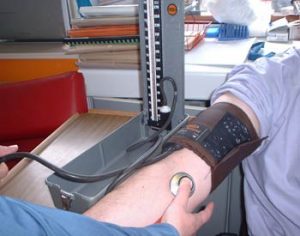Blood Pressure
About Blood Pressure
 You can have high blood pressure and never know it because there are no warning signs or symptoms. About 1 in 3 adults in the U.S. has high blood pressure. And high blood pressure increases your risk for heart disease and stroke, which are leading causes of death in our country.
You can have high blood pressure and never know it because there are no warning signs or symptoms. About 1 in 3 adults in the U.S. has high blood pressure. And high blood pressure increases your risk for heart disease and stroke, which are leading causes of death in our country.
That's why it's important to have your blood pressure checked regularly, and the good news is that there are steps you can take to prevent high blood pressure, or to treat it.
First, let's talk about prevention: Eating a healthy diet with plenty of fresh fruits and vegetables provides you with heart-healthy nutrients like potassium and fiber. Cut back on saturated fat, cholesterol and sodium: three very high elements of restaurant meals, especially fast food.
Being overweight can also raise your blood pressure; losing weight can help lower it. Exercise and physical activity will not only help you maintain a healthy weight, the activity itself can help lower blood pressure. Aim for a moderate level of physical activity for at least half and hour most days of the week.
The test for high blood pressure is quick and painless--the health professional wraps an inflatable cuff around your arm and listens to your pulse with a stethoscope as the air releases from the cuff. The numbers that appear on the blood pressure guage measure both systolic pressure (the pressure in your blood vessels when your heart beats) and diastolic (the pressure in your vessels when your heart rests between beats.)
Effects of High Blood Pressure
Angina -- High blood pressure can harden your arteries, which can cause chest pain (angina).
Heart Failure -- If your heart can't pump enough blood and oxygen to your other organs, you can suffer heart failure.
Heart Attack -- A heart attack occurs when the blood supply to your heart is blocked. This causes the heart muscle cells to die from lack of oxygen.
Stroke -- High blood pressure can burst or block arteries supplying blood and oxygen to the brain, causing a stroke.
Come in for a free blood pressure check. It could save your life. Call today:417-745-2138.
